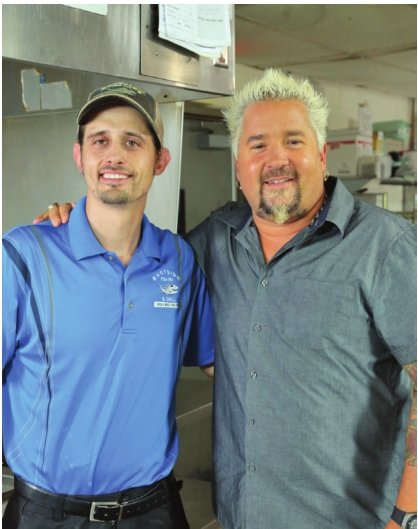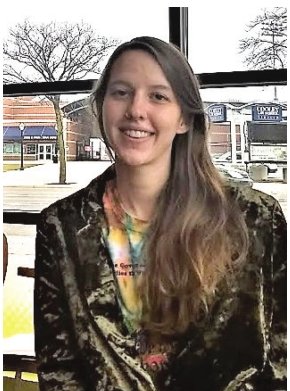From weed to ‘crack’ — chicken, that is
He could have been a master gardener, cashing in on what is expected to be Michigan’s next big cash crop. That’s if Henry Meyer hadn’t been busted with so much pot the Drug Enforcement Agency officers who busted him were in awe, at least in his telling.
“The DEA wanted to interview me to find out how the fuck one person could grow this much marijuana in a house with no help,” Meyer said.
In 2010, Meyer, now 33, pled guilty to manufacturing marijuana plants. U.S. District Court judge Robert Bell handed down a 30-month sentence, which he served in full.
The business skills required to run an illegal pot business have transferred seamlessly to his ownership of Eastside Fish Fry, home of “the best damn chicken in the city” (which will get no argument from this writer, other than to say that the catfish nuggets are even better).
His cooking talents even earned him a spot on national television with Guy Fieri’s “Diners, Drive-Ins and Dives” on the Food Network. The show highlighted his decision to only hire non-violent drug felons like himself to work alongside him in the chicken joint.
“I’m blessed and I’m thankful and I’m happy about what I’ve done for my friends at the fish fry — I do not call them my employees, I call them my friends,” Meyer said.
But the best chicken in the world (and a co-sign from the most famous man alive who’s still rocking frosted tips) won’t rake in profits like medical marijuana.
Since pot shops dispense medicine, you’re almost guaranteed return customers who have an actual need for your product. Not so in food service, even when your meals feature the addictive “crack chicken” seasoning.
Meyer is grateful for his successful transition out of prison, something he knows many felons don’t even get a chance at.
But he also knows he’s missed the boat on an incredibly lucrative industry, expected to reach nearly a billion dollars in annual revenues statewide, according to the state House Fiscal Agency.
“I’d never even worked in a restaurant in my life. I’d never even fucking swept a floor at a Burger King,” Meyer said. “And I run a business now that’s gonna bring in $2 million this year.”
“Could you just imagine what I could do with the fucking Pro Bowl?” he said, in reference to the former bowling alley site where PG Manufacturing, LLC has applied for eight grower licenses.
If awarded them all, PG Manufacturing would be eligible to grow 12,000 plants. Taking conservative estimates of four ounces of smokable bud per plant and $250 an ounce, that’s 3,000 pounds and $12 million in revenue — all for one operation.
But his arrest took away the ability to apply weed skills he’d been building for years. Under emergency rules released by the state’s Department of Licensing and Regulatory Affairs last December, drug felons convicted within the last 10 years are banned from obtaining licenses.
Potential employees for marijuana facility license applicants are banned from working if they have drug felonies within 10 years as well. His only hope would be to receive a written exception from the state’s Board of Medical Marihuana Regulation.
Meyer says he’s well connected with Lansing’s pot shop owners, who regret they couldn’t help a friend capitalize on what would have been a perfect culmination to years of practice with marijuana cultivation.
“I love them and they love me -- it ain’t nothing about greed or jealousy,” Meyer said. “I know for a fact that if this law ever changes, I could go there and I could make a quarter-million dollars a year just working for them. I know that.
“But they also know that if they were to give me a job and if they were to use my knowledge and wits, they could be risking their millions.”
But more important to him than sitting on the sidelines while big pot interests with less experience than he does cash in -- and that’s saying a lot, since the mere mention of “those yuppity fucks” sends him into tirades about their hypocrisy -- is the damage it’s done to his relationship with his 10-year old son.
Two and a half years is a lot of time to spend away from your child, especially at the crucial preschool ages, which his son, whose name Meyer asked not be used, was going through while he was locked up.
His son has already found out about Meyer’s drug-dealing past through his mother, something Meyer said he wanted to wait to tell him.
Meyer thinks his absence has had a major effect on his son. He has behavioral issues, and as a result Meyer has had to be more assertive than he would like to be when he gets to spend time with his son.
Case in point: Meyer had planned a weekend trip to Schaumburg, Illinois, for dinner and a trip to the 1300s at the Medieval Times restaurant. That week, his son was suspended from the school bus and kicked out of music class all within the span of three days.
The trip back in time never happened. “It made me want to cry, man,” Meyer said. “Not because I spent money, not because I took time off of work, but because he fucking deserves it, he deserves me to be who I am.”
As Meyer continues to grapple with the personal fallout from his arrest and the barriers it poses to re-entering the industry that he learned so well as a young adult, he wishes he had the chance to legitimize his old business the way so many others will get the chance to this year.
“If the government would’ve came to me back then and said, Hey man, you can keep doing everything you’re doing, you just gotta give us 30 percent of everything,’ I would’ve given them 35 percent. Happily.”
Using the law, attorney is turning the tables in the war on drugs
Marijuana has always been present in the life of Joshua Covert. Growing up, his parents used the controversial plant and to him it was no big deal.
That’s until the second grade, when a law enforcement officer came to his class to tell him how horrible drugs and people who use them are.
“They came in with this display case of roach clips, and bongs, and they were showing it to everyone in class and saying that people that use these things are losers, and dopers, and all these derogatory terms,” said Covert, 41. “I knew that they were lying to me, because I knew my parents, my parents’ friends and family members, other parents would come by. They weren’t like that, so I knew at that point the police, law enforcement, was lying to me.”
That sent Covert on a trajectory of “challenging” authority he said. He spent most of his childhood in Portage, a cozy, affluent, bedroom community in southwest Michigan.
“That kind of started, I would say, a healthy distrust of authority,” he said with a laugh. “From that point on, I kind of knew I wasn’t being told the whole story.”
But it wasn’t just arguing that motivated Covert to become a lawyer.
“I started thinking about my mom going to jail for using cannabis and that’s kind of like what spurred the thought about going to law school.” he said. “I decided to actually do that, to help keep people like my mom out of jail.”
At 31, he made the decision to hit the law books rather than the slopes.
During an internship in Kalamazoo he got his taste of political organizing. He worked to help push an amendment to the Kalamazoo City Charter making marijuana possession “the lowest priority” for law enforcement action.
And he’s been burning his name into the legal and administrative rule books since he graduated. Key among his victories? Getting “baby Bree,” Brielle Green, returned to her family in 2013. She’d been removed from her home because both her parents Steve and Maria grew medical marijuana, legally, in the home.
He also challenged a Michigan law which could have prevented medical marijuana patients from transporting their medication. That law required the marijuana be kept in a secure space not accessible from the passenger compartment of the vehicle. Covert took the case in Clinton County and fought to the State Court of Appeals, getting the law thrown out as it would have applied to medical marijuana patients.
His final achievement, and one he is particularly proud of, was preventing an immigrant from being deported for using marijuana. The man had come to the U.S. to receive medical treatment and “had made a life for himself” and his 12-year-old son in the U.S. Law enforcement conducted an illegal search of his home, a judge ruled, and found his medical pot. Because the search violated the Constitution, the evidence was suppressed and the man was freed. Had he been convicted, he would have been deported.
A large part of his work, he said, is going to be the battle to take a black market product shrouded in stigma and put it in a legitimate regulated market.
As an example, he shared the story of people who were denied state licenses because of “20- year-old” convictions.
“I think it just kind of goes to show,” he said, “even though there’s a law that you can get licenses,” he said, “there are people out there that are going to try to do whatever they can to keep you from getting a license because there’s still a stigma associated with it.”
From ‘Just Say No’ to advocate for cannabis
Her grandmother is a Fox News consumer, so was anxious about revealing her burgeoning marijuana activism.
Dawson’s grandmother, 70, questioned her when she said she used pot.
““She was like, ‘No, you don’t,’ Dawson said. ‘I know you, you don’t smoke weed. You’re not someone who smokes.’ And I’m like, ‘Yes, I am, a lot.’” That’s when Dawson pulled out her cell phone and started sharing photographs of marijuana with her grandmother. She said the elder woman got up, got another cup of coffee and returned, “ready to understand.”
Dawson, 23 and a Michigan State University graduate, was fighting what she called “indoctrination” against marijuana. Such indoctrination has led to a stigma about the drug, and one she struggled with as she started experimenting in her late teens.
“I kind of had to realize that it didn’t make you a bad person or lazy or anything, because that was really what I was worried about. I was always an overachiever in high school,” she said.
Adding to the reminders of the alleged negativity of pot, a DARE Officer for Saline lived on her block.
“It had a strong effect on me,” she said.
“Even into high school, my first boyfriend was smoking weed and I used to get in fights with him about it all the time. I used to be one of those high on life people. I would get adamant about it and when my friends were smoking weed, I’m like, ‘Are you sure you need that? You don’t need that.’” As a student at Saline High School in Washtenaw County, she received top grades and served as student government president. But that focus on achievement took a toll. She said she developed anxiety, which led her to try marijuana during a substance experimentation phase inher teen years.
“The alcohol actually became more like a gateway for the marijuana than the other way,” she said, turning an opposition frame famously touted by Attorney General Jeff Sessions. The frame? Marijuana is a gateway drug to other drug use, including heroin and cocaine. Dawson laughs at that, noting that the impact of marijuana was better than the prescription medications in addressing her anxiety and she saw no need, and had no desire to use other drugs as a result. “That was it.”
She chairs the Michigan Democratic Party Cannabis Caucus, which Sunday scored a political coup when it helped secure the party’s endorsement of civil rights attorney Dana Nessel over former U.S. Attorney Patrick Miles.
Her movement into the cannabis trade and movement is also informed by her educational experience. She graduated from MSU with two bachelor’s degrees. One degree was in Spanish, the other in social work.
While she is not working as a traditional social worker, she sees her work in the cannabis industry as an extension of the philosophies of social work.
“I love being able to do something that not only makes me feel good, but do something that I know makes other people’s lives better,” she said.
That work is underpinned by a rejection of corporate America, she said.
“Maybe I’m not benefiting everyone,” she said, “I’m maybe not benefiting the corporations at the top that want to take this from us and exploit it and make Walmart weed. But I am helping people.”
With history of working for GOP, an unlikely cannabis advocate
Jarren Osmar, as he had for weeks, stood on the podium and began to launch into a lecture assailing city officials for undermining democracy. As the legal liaison for Let Lansing Vote, he’s led protests at City Council meetings.
April 9 was a change. President Carol Wood gaveled him down when he began to speak, noting that marijuana was not on the business agenda. Osmar, 35, kept talking.
Wood recessed the meeting. “Officer remove him, please,” she commanded.
A Lansing Police officer physically pulled Osmar from the podium, escorting him into the lobby of Council chambers.
“When they told me I had to stop speaking, I was flabbergasted,” Osmar said.
“Because it was a democracy and transparency issue when they told me to stop speaking, I refused.”
It was the culmination of the Grand Ledge native’s evolution on marijuana. The self-described guy “who followed all the rules,” and son of what he described as “hippies,” pot had not been an issue for him in early adult life.
Osmar attended Michigan State University’s James Madison College, where he studied political theory. He said he completed his course work but didn’t turn in his final paper and didn’t receive his bachelor’s degree.
He’s a former legislative staffer who worked his way up the ladder into a cushy spot as assistant to the state chairman of the party traditionally against marijuana legislation, the GOP.
“After working for the Republican Party, I really began to distrust authority and the way things worked,” Osmar said. “It’s with that in mind that I started to be more open-minded about what my friends in the cannabis world were doing.”
Osmar said he’s been involved in voter activism throughout the Midwest since at least 2014.
When he was about 30, his outlook on cannabis changed. A friend, he said, was sick from stage IV cancer. The man had developed the gaunt, skeletal frame of a person on the edge of death and had faced “every medical procedure there was.” In an act of desperation, the man started using a potent extract of marijuana called Rick Simpson’s Oil, or RSO.
“He does 60 days of this treatment and he goes in for the scan and the cancer’s gone,” Osmar said. “That convinced me that this has merit.”
Osmar threw himself into cannabis activism. He is now employed in the industry, although he declined to explain in what position. He does not consume any marijuana products.
The self-proclaimed democracy advocate said he’s excited to potentially see governmental checks and balances play out in his organization’s favor — and in favor of turning pot regulation over to the voters.
Since City Clerk Chris Swope made a mistake in throwing the petitions out, it would only be fitting for another elected official to right that wrong, he said.
“There are other powers that you can appeal to that don’t have a stake, so it’s very interesting to me to hopefully see the system working,” Osmar said.
With a likely 2018 ballot measure to legalize recreational marijuana coming, the once black market drug would be coming out of the shadows. That means new regulations and enforcement mechanisms.
It’s the little shops that provide a personal touch, sometimes even giving valuable products away to patients in dire need, Osmar said. That’s what motivates him to keep firing stones at giants closing in from every angle.
“We see everything turning into Walmart and Amazon, and you have to resist that,” Osmar said. “It’s a shame to take this middle-class cottage industry and turn it over to big money people who don’t know anything about it.
The loss of the community would hurt Lansing, he said.
“Your cashier doesn’t know your name at Walmart, you’re just a number,” he said. “That’s what we’re losing when we only allow big institutions to do this.”
Support City Pulse - Donate Today!
Comments
No comments on this item Please log in to comment by clicking here